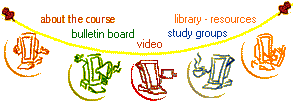|
How
is the Course structured?
We estimate that the time needed to
complete the course (including all the tasks) will be about 40 hours.
The course consists of 6 modules; you
must undertake all 6 modules to complete the course.
Each module consists of:
- A key text (about 10 pages
in length) to read and then discuss with a colleague or colleagues in
your own school or centre
- Related texts and links to
help you develop your understanding of the main ideas in the module
- References to important materials
on the Internet and in books
- A task which includes actions
you have to undertake.
The tasks are designed to help you
to:
- explore ideas relating to the topic
of the module
- reflect on your current practice
- develop your teaching in the light
of what you have read and reflected upon.
In carrying out the tasks you will
have the opportunity to share your experience with teachers elsewhere
in Europe via facilities in the TESS Network. It is an essential element
of the course that you should participate in discussions both with your
own colleagues and with teachers elsewhere in Europe.
On conclusion of the course you will
receive a certificate of participation.
Throughout the course you will have
the support of a local tutor.
Figure 1 shows the course structure
and summarises the course content.
Figure 1
Teaching Children
to Read
An Open and Distance
Learning Course for European Teachers
Course Structure
|
Module
1
Community and
Culture
Elements of
a supportive environment
|
Module
2
Family
Description
of a supportive family
- Reading
together
- Books in
the home
- vocabulary
|
Module
3
School
Description
of a supportive school environment
- The classroom
- Around the
school
- The school
library
|
|
Module
4
What Children
Bring to School
- Attitudes
- Gender
- What school
brings to children
- Emergent
literacy
|
Module
5
Learning to
Read
- Reading
Development
- Strategies
- Methods
- Comprehension
- Sharing
- Assessment
|
Module
6
The Use of
Reading
- Goals
- Assessment
- Reading
to learn
- Reading
to enjoy
- Reading
for information
|
|

